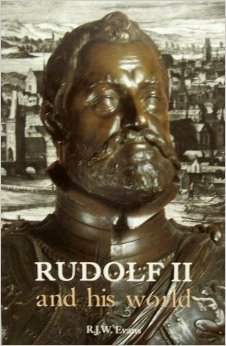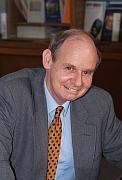Who was Rudi 2 and who cares? Rudolf was King of Bohemia, King of Hungary, and King of a few other places, too, He was a Hapsburg whose accession to the Imperator was vexed, but in the end went smoothly. The fiction was that electors (members) of the Holy Roman Empire chose the the emperor. By the time Rudi came along it was a long title with little substance and meaning.

The Holy Roman Empire, for those who slept through ‘The History of Western Civilisation’ when it was still possible to teach under that title goes like this: A Pope crowned Charlemagne Emperor in 800 A.D. to defend the faith. Big Chuck passed the sword on to his sons who split up his Empire and in 1100 A.D. one of his distant successors revived the title ‘Holy Roman Empire’ to gain prestige. The senior most leader among the entities allied under that title was then dubbed the emperor because he had the biggest army, the most gold, the most I.O.U.s to call in during a crisis, the smoothest talker, and sucked up to the Pope better than others. The Hapsburgs excelled at these empire-building talents and the title became theirs. (The entities were principalities, dukedoms, free cities, kingdoms big and small, Papal clients, and others.)
In the late Fourteen and Fifteenth Centuries the Hapsburgs were in the front line against Ottoman incursion into south eastern Europe. Their capital, Vienna, was besieged twice by armies of the Ottoman Empire. If this pressure encouraged unity within Christian Europe, the Reformation and Counter-Reformation produced dissension. Rudi’s dad was Double Max (Maximilian II) whom Machiavelli once handed a letter in Tyrol. During most of Rudi’s time in the big chair the Ottomans were preoccupied by Persia on one flank and Russia on another. Still Rudi moved the capital of the Empire to Prague to create a buffer zone from the dreaded Turk.
He was himself not religious, and in a way that made him acceptable to the many religious factions, sects, cults, that tried to outdo each other in holiness, usually by killing each other. He participated in religious rites only for reasons of state. He appointed protestants and as well as catholics to court positions. Like others in Europe, he had no wish to break with the Pope as England had done, but likewise he had no wish to have the Pope dictate to him on foreign and domestic policy, protect corrupt priests from civil law, and siphon off taxes in the form of religions tithes. He gave outward obeisance to the Papacy just enough to be tolerated, but seldom gave substance.
He was widely regarded as a weak ruler, and this book elides the political aspects of his reign, yet he kept his seat for thirty-six years, quite a tenure given the volatility of the place and time. There were plenty of other Hapsburgs who might have been willing to replace him, but somehow he kept them busy elsewhere, and made enough friends to discourage explicit aggression.
He was also a keen supporter of the arts, humanities, and sciences, and he made Prague a European capital for all three. A the time Paris, that city of light, had Catholics and Protestants were slaughtering each other in the streets in God’s name. Elizabethan England continued Henry’s oppression Catholics with the sword, while in Spain Phillip II proved his devoutness by unleashing the Inquisition. In Russia Ivan earned the sobriquet the Terrible. Ramshackle though the Holy Roman Empire was, uncertain as the Emperor’s authority was, yet his example encouraged a toleration rare for the times, one that evaporated within seven years of his death, when the famous Prague defenestration heralded the Thirty Years War, or was it Hundred Years War, or does the name matter? It was a long, bloody, pointless war of ideology, i.e., religion.
Even as Rudi acceded to the purple he was regarded by the observers as a feeble unstable, and impoverished emperor who was more prisoner of the past than the master of the future. In London, Madrid, Pairs, Moscow, Rome, and Istanbul smart money said he would not last. Yet he did last though he made many compromises that saw the Holy Roman Empire gradually dissolve around him, it did so without a conflagration.
Even while those forces spent themselves, he made himself the vice-chancellor of the greatest university in Europe at the time on that hill top in Prague. He gathered there all manner of writers, thinkers, philosophers, technicians, naturalists, magicians, astrologers, and astronomers, most of whom would have been tortured in Spain, slammed up in England, murdered in France, burned alive in Rome. Tyco Brahe and Johannes Kepler were just two of many, though their names are most well known to us today, they were not the leading lights at that time. Rudi was a collector and he collected objects and also people. Perhaps he was not so much a vice-chancellor as a curator of a museum. He amassed a collection of works or art and science that had no parallel at the time, nor after. There were paintings, sculptures, drawings, engravings, candle sticks, tableware, crowns, armour, and all of that.
He particularly liked mechanical contrivances, like the mechanical Turk of legend, whole floors of the palaces on Hrady Hill were full of automata, clockwork servants, perpetual motion machines, hydraulic risers, and so on. Many of them were devised and built especially for him, each unique.
There was then no boundary around science (or art for the matter) and he also supported alchemy, astrology, and the occult sciences of spiritualism, divination, cabalism, and more. I will devote a second note on all of that.
He acquired a massive library by buying up the complete libraries of others from around Europe. By Imperial command he borrowed whole libraries from monasteries in the realm, which he never returned. Many of the boxes the books were transported in were never opened. As in the Juan Luis Borges story there was no catalogue.
The whole assemblage made Prague a magnet was those with a taste for learning. With his death the centripetal forces scattered both the people and the objects. When we visited Prague, partly inspired by the little I then knew of Rudi’s efforts, there was nothing left but the palaces on the Hill and a few posters reminding the viewer that Brahe and Kepler had once worked there.
Lord Bragg had a program on Rudolph some time ago and it struck with me. When the opportunity came to go to Prague, I took it but the reading I did then was not very informative. This book is much more detailed, but it is heavy going.
 R. J. W. Evans
R. J. W. Evans
The author wrote it for the other dozen specialists in the European history of this time and place. No concessions are made to the educated reader (that’s me) despite the Thames and Hudson imprint. It reads like a very good, but dead boring, PhD dissertation. However in a PhD examiners would expect all the quotations from Latin, German, Czech, Slovenian, Italian, French, and Occitan to be translated to show that the author understood them. Here such sources are paraded in the original. Likewise in a PhD examiners would expect all the names mentioned to be explained. In these pages there is much name-dropping, and little explanation.
Skip to content
